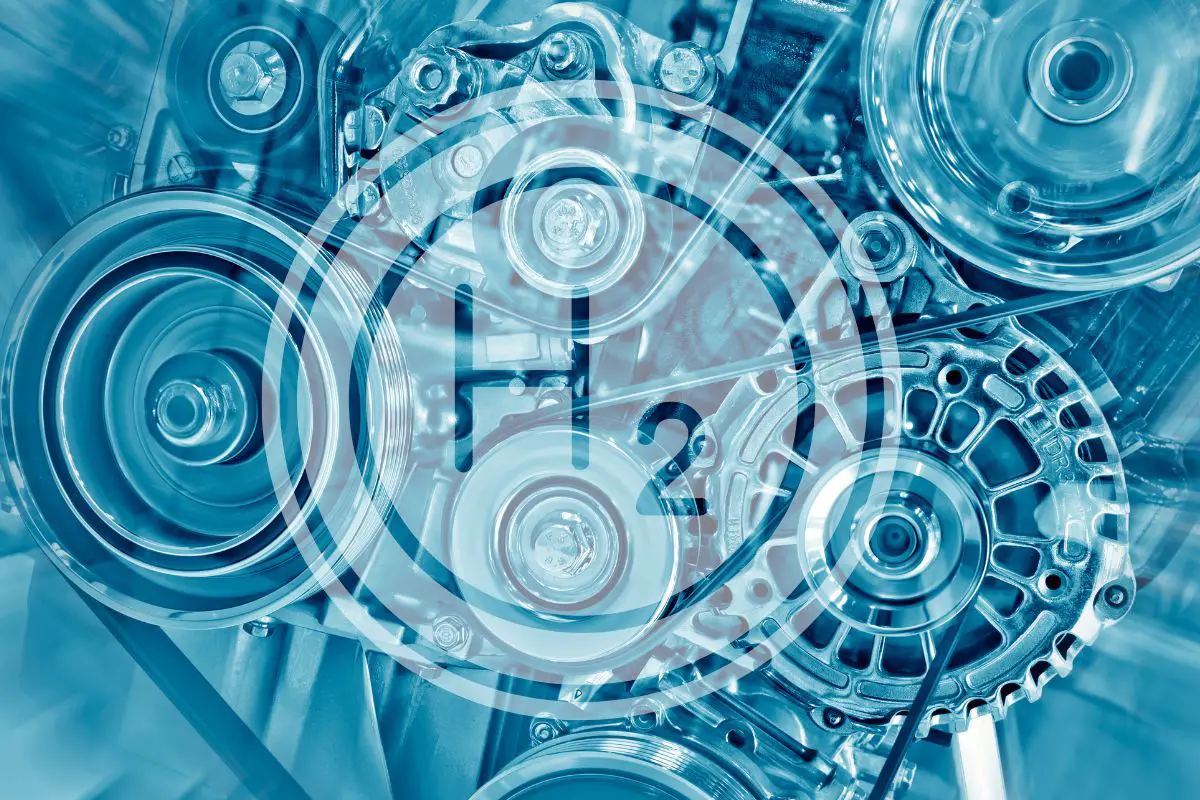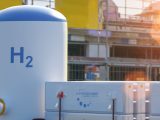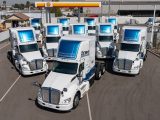
JCB hydrogen engines reach major production milestone
December 15, 2022The construction equipment manufacturer has invested £100 million into the H2 project.
JCB’s £100 million ($124.2 million) investment into a project to produce extremely efficient hydrogen engines successfully moved forward and has reached a major production milestone.
50 H2 combustion engines have been produced.
For over a year, a team of 100 JCB engineers has been working on producing hydrogen engines and the 50th JCB hydrogen combustion engine has come off the production line, a big step in the development process.
“The JCB engineering team has done a fantastic job to develop a brand-new hydrogen engine,” said JCB Chairman Lord Bamford. “They have gone back to first principles to completely re-design the combustion process to work for hydrogen.”

Bamford explained that in doing so the team has reached two major achievements. They have steered JCB toward the 50 hydrogen combustion engines production milestone and they have secured the company’s place in history as the first construction equipment company to develop a combustion engine fueled by hydrogen that fully works.
JCB created its hydrogen engines because it is cheaper than using fuel cells.
JCB is no stranger to the use of hydrogen fuel, and previously investigated the use of fuel cells back in July 2020 with the unveiling of its 20-ton 220x hydrogen-powered excavator, the first ever H2-powered excavator in the construction industry.
However, for now, the company feels that fuel cells are too complicated, too expensive, and not tough enough for construction and agriculture equipment. That said, as they still wanted to use H2 technology, the JCB engineering team were challenged to think differently, which resulted in the hydrogen combustion engine project.
“The unique combustion properties of hydrogen enable the hydrogen engine to deliver the same power, the same torque, and the same efficiency that powers JCB machines today, but in a zero-carbon way,” said Bamford, who also noted that hydrogen combustion engines have other notable benefits as well.
Unlike fuel cells, H2 combustion engines leverage diesel engine technology components and do not need rare earth elements, like platinum. Moreover, combustion tech has long been well proven on construction and agriculture equipment.
Currently, the JCB hydrogen engines already power prototype backhoe loaders and Loadall telescopic handlers. The company has also designed and built its own mobile refuelling bowser, which takes fuel to the machines. The bowser can be transported on a trailer or the back of a modified Fastrac tractor and holds enough hydrogen to fill 16 H2 backhoe loaders.



 With over 15 years of reporting hydrogen news, we are your premier source for the latest updates and insights in hydrogen and renewable energy.
With over 15 years of reporting hydrogen news, we are your premier source for the latest updates and insights in hydrogen and renewable energy.
The weight capacity of Refilling H2 gas to each equipment of the 50 produced combustion engine loaders and Backhoes
The Trailer capacity of H2 gas
Comparison between Hydrogen Fuel Cells and using Hydrogen gas Refueling
Thank you
To add to your questions: what is the NOx performance of these engines?
I like
Reading about hydrogen engine development for heavy goods and construction machines today has been remarkable. The fact that it seems to suggest the retention of internal combustion engine and all the components (plus modification components) will keep thousands of jobs in the supply chain and still cut emissions. I have worked for more than 45 years in engine reconditioning and in situ engine machining, the retention of ice engine has the potential to save and make many many jobs.
IWhat you have achieved with this work is beyond Remarkable. Thank You.
I had the same view until I realised that we are the end of a revolutionary era of power generation and the beginning of another, much the same as the end of the steam power era and the start of the electrical era.
If the next method of power generation (be it hydrogen or nuclear) depends on the natural resources required to manufacture the tooling, then nuclear will win.
That’s a great achievement! Maybe the world can do that instead of electric! Sounds like a better alternative!
When companies like Toyota & Honda are producing Hydrogen prototype vehicles it tends to make one think fully rechargable electric battery cars will become the Betamax of our generation.
Until you realise they are the insignificant H2 exception that proves the obvious BEV rule. Have a look at the global sales figures and production trajectory for BEV vs H2 cars.
The choice is simple, take (green) electricity and power electrolysers to make H2 to power cars, or take green electricity and power cars.
H2 cars are *already* the Betamax. There’s no real debate anymore. The only realistic arguments are around whether there is any place for H2 in HGV and HDV transport.
A facile comparison given that the article described an HCE in which no electrolyzed is required. You may be right that BEVs, even with their projected lithium supply constraints, may win the day but the debate is not over by any means.
If this technowledge is integrated with The Railway a Sound hydrogen distribution network can be achieved for all forms of transport.
What a great piece of news from a Great British company that exports to the world. This proves we can still be innovative and manufacture machinery here instead of giving away our jobs and independence to China, who are not our friends and on whom we have become far too reliant. We need far more companies like JCB.
I worked at jc for fifteen years. Always a top innovational company thriving for perfection
They treat the staff well,with a good salary and health and pension schemes,
Alas retirement comes along and had to leave
I wish them all well and a full order book as reported today with 500 more jobs filled
Well done Sir Anthony you are a credit to your father Joe, the founder of JCB
Keep leading the field
Excellent News, I have been Following this with huge interest, And was Amazed at how the JCB HYDROGEN Projects were Moving forward, and planning the Use in construction Machinery, Well Done This is the Future, Joe Bamford would have been Proud of the Excellent team Work
Hydrogen makes sense. Electric vehicles are simply garbage and extremely damaging to the environment. Keep up the good work.
Hydrogen makes no sense in a fuel cell for vehicular transport, it makes EVEN LESS sense when burned as a fuel in an ICE. This project is doomed as a commercial exercise.
Talk about doomed, current bevs take to long to charge, limited range, weighs way to much and requires a dwindling supply of materials to produce their batteries.
California the mecca for bevs can’t even keep the power grid up to charge all the cars… I envision massive traffic jams with thousands of dead battery vehicles lining the highways. Battery vehicles are obsoleted before they ever truly begin, if you think Lithion batteries are expensive now, wait til it runs out.
That’s excellent news. I’m a firm convert when it comes to Hydrogen and have always believed that modification to the Ice cycle would allow hydrogen to be used. Well done JCB, I would loved to have been part of the development team.
As Steve Potts asks: what is the NOx performance of these engines? The answer Steve is that they will produce significant amounts of NOx like any air aspirated IC engine (our air is around 79% nitrogen and it gets burnt by any high temperature flame), which might be reduced a bit by using the urea based additive used to reduce NOx from diesel engines, so as Steve asks how much NOx do they emit?
Considering that nitrogen oxides (NOx) are harmful to health and the environment, and have been shown to kill in big cities, so burning any fuel in air is likely to be banned in the long term.